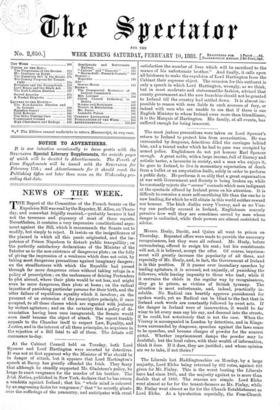Messrs. Healy, Davitt, and Quinn all went to prison on
Thursday. Repeated offers were made to provide the necessary recognisances, but they were all refused. Mr. Healy, before surrendering, offered to resign his seat; but his constituents will not, it is believed, accept the offer. Of course, imprison- ment will greatly increase the popularity of all three, and especially of Mr. Healy, and, in fact, the Government of Ireland is in this position. If it passes over incendiary speeches by leading agitators, it is accused, not unjustly, of punishing the followers, while leaving impunity to those who lead; while if it restrains the chiefs in the regular way by recognisances, they go to prison, as victims of British tyranny. The situation is most unfortunate, and, indeed, practically in- soluble. No Radical can heartily approve punishment for spoken words, yet no Radical can be blind to the fact that in Ireland such words are constantly followed by overt acts. If the danger in Ireland were of insurrection, it would be far wiser to let every man say his say, and descend into the streets, if he could, but notoriously that is not the case. When the Viceroy is accompanied in London by detectives, and in Kings- town surrounded tiy dragoons, speeches against the laws cease to be speeches, and become charges of powder for the nearest pistol. Whether imprisonment damps the powder may be doubtful; but the local rulers, with their wealth of information, think it does. If it does, they are justified ; and whose opinion are we to take, if not theirs


































